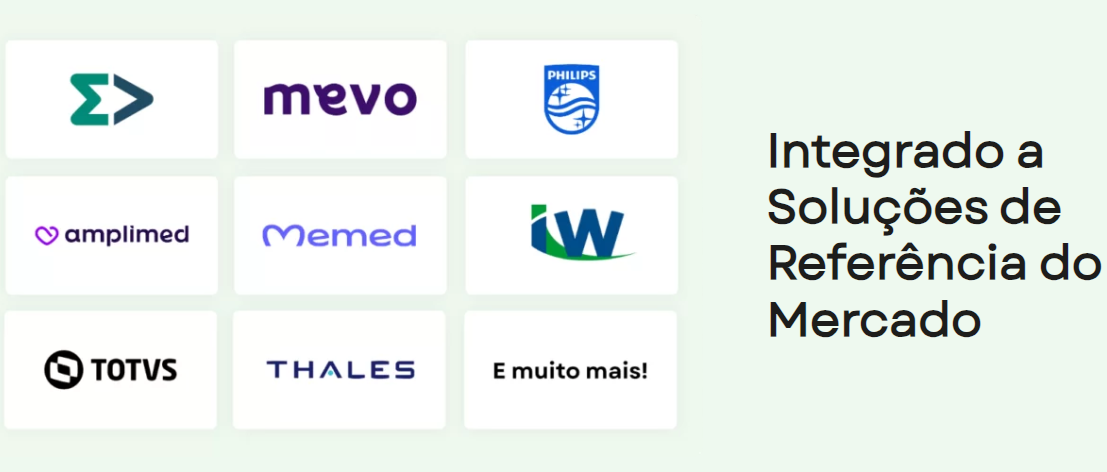
With increasing digitalization in the healthcare sector, innovative technological solutions are becoming essential to improve efficiency and guarantee information security.
Eval Digital, a pioneer in Electronic Signature technology, was recognized as one of the leaders in the IT – Complementary Systems category by the prestigious Health Leaders award, presented by Grupo Mídia.
The award ceremony will take place on June 6th at the Palácio Tangará in São Paulo. Marcelo Tiziano (Support Director), Murilo Fernandes (Commercial Director) and Juliana Makimi (Human Resources Director) will receive this award on behalf of Eval.
Eval Digital’s trajectory of more than two decades has been marked by an incessant search for innovative and technologically advanced solutions for the healthcare sector.
From the outset, the company stood out for its pioneering vision in the application of electronic signatures in systems such as the Electronic Patient Record (EPP), recognizing the critical importance of data security and integrity in the medical environment.
Over the years, we have consolidated our position as a leader in this field and expanded our solutions to a variety of sectors, including education, industry and government.
Winning the Healthcare Leaders Award validates Eval’s ongoing dedication to process safety and efficiency and highlights its position as one of the main drivers of digital transformation in the sector.
A journey that began more than two decades ago and continues to shape the future of healthcare.
Health Leaders Award
The Health Leaders Award has been presented since 2013 and is widely recognized as the highest tribute to companies and professionals from various segments of the health sector production chain, including industries, suppliers, distributors and operators.
The ceremony celebrates the achievements of the award-winning companies during the 12 months preceding the event. The winners are selected by Grupo Mídia’s editorial board, based on market research and votes open to the public via the awards’ official website.
Award categories
The Health Leaders Award is divided into several categories, reflecting the diversity and complexity of the sector. These categories include:
Supplementary Health
This category recognizes health operators and insurers who demonstrate excellence in service and innovation.
Equipment Industry
This group includes companies that produce high-tech medical and hospital equipment.
Pharmaceuticals
Includes pharmaceutical companies that excel in the production of medicines and therapeutic solutions.
Diagnostic Industry
: Recognizes contributions to the field of medical examinations and diagnostics.
IT and Innovation
: Focused on companies that offer technological solutions, such as Eval Digital, that drive improvements in the health sector.
Hospital Management
: Aimed at hospital managers who are implementing innovative practices in their institutions.
Philanthropy and Social Responsibility
Awards organizations that make a significant contribution to social welfare and community health.
Entrepreneurship
: Highlights personalities and new businesses that bring transformative ideas to the healthcare market.
Teaching and Research
: For institutions and individuals who contribute to the advancement of health knowledge.
Sectoral References:
Praises professionals and entities that are references in their specific areas in the health sector.
Digital Transformation and Electronic Signature
Our Electronic Signature solution works with the main certificates on the market: Bird ID, V Cert, Vidas, SafeID and Cert Sign. It is also approved by the Brazilian Society of Health Informatics(SBIS) as a tool for digital solutions.
Implementing this technology promotes compliance with data protection and privacy standards, optimizes processes, reduces costs and substantially improves patient care.
Electronic Signature: Benefits
An e-signature API gateway solution, offering easy integration, security and total efficiency. A more efficient and secure way of handling documents and contracts, complying withregulatory requirements and ensuring legal validity.
With access to an innovative and versatile technological platform, it can be integrated with systems for generating qualified electronic signatures and digital seals in hybrid form.
Perfect Fit for Any Business
We offer flexible plans for companies of all sizes, guaranteeing solutions adapted to the specific needs of each client
Solution approved by SBIS as a digital signature tool
Digital signature tool approved by SBIS, guaranteeing compliance and security.
Simple and effective integration
API gateway in Azure for fast and efficient integration, guaranteeing immediate benefits from the electronic signature.
Different segments
We serve various sectors: health for secure reports, education for document management, industry for process optimization, finance for secure transactions and legal for efficient contract signing.
Continuous Innovation: Generative AI Platform for the Hospital Sector
Looking to the future and in the spirit of constant innovation, after 20 years of success, Eval Digital has expanded its solutions with a
Generative AI platform, Evaldo.IA
For the healthcare sector, this new tool aims not only to increase operational efficiency, but also diagnostics. Evaldo processes large volumes of medical data in seconds, providing preliminary diagnoses that can be crucial in emergency situations.
In patient management, it automates scheduling, follow-up and even communication with patients, allowing healthcare professionals to focus on what really matters: saving lives.
Thanks to Grupo Mídia, Eval’s Clients and Employees
We would like to express our sincere gratitude to Grupo Mídia for this honorable distinction and, above all, to the clients whose trust and vote were crucial to this achievement .
This victory is ours, together with the clients who have accompanied us throughout this two-decade journey, always believing in and investing in our solutions.
We couldn’t have achieved this without the effort and dedication of each and every one of our employees. The Eval Digital team deserves thanks for its commitment to every successful project and every innovative solution we offer our clients.










